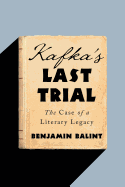
Who owns the working papers, sketches and correspondence of an artistic genius: the artist and his heirs, the country of his language and work, or the larger diaspora of his ethnic origins? In the case of Franz Kafka, the German-speaking, Jewish Czech who set the tone for 20th-century literature, the legal answer didn't come until 2016--more than 90 years after his death. Unlike the bureaucratic nightmare fiction of Kafka's famous The Trial, Israeli translator and historian Benjamin Balint's Kafka's Last Trial tells a true, but similar, story of the tangled bureaucratic path Kafka's archives traveled. Despite his expressed desire to have them burned, their fate eventually rested with the Israeli Supreme Court to adjudicate between Kafka's close friend Max Brod's secretary's daughter, who possessed them, and the National Library of Israel. In follow-the-money fashion, at the heart of this legal wrangling was Eva Hoffe's desire to sell the archive to the highest bidder--potentially the well-funded German Literature Archive in Marbach.
Balint's research into this labyrinthine legal morass leads him into the history of Kafka's friendship with the much more prolific writer Brod and their involvement with a coterie of Prague Zionists. Exploring the friends' nights of philosophical and literary bandying, which often ended in brothels and cafes, he describes how the personal papers eventually found their way to Brod's confidante and secretary Esther Hoffe. Mixing biography, history, literary criticism and legal thriller, Kafka's Last Trial raises intriguing questions about the conflict between the state's interests in an artistic legacy and those of the artist and his heirs. --Bruce Jacobs, founding partner, Watermark Books & Cafe, Wichita, Kan.

